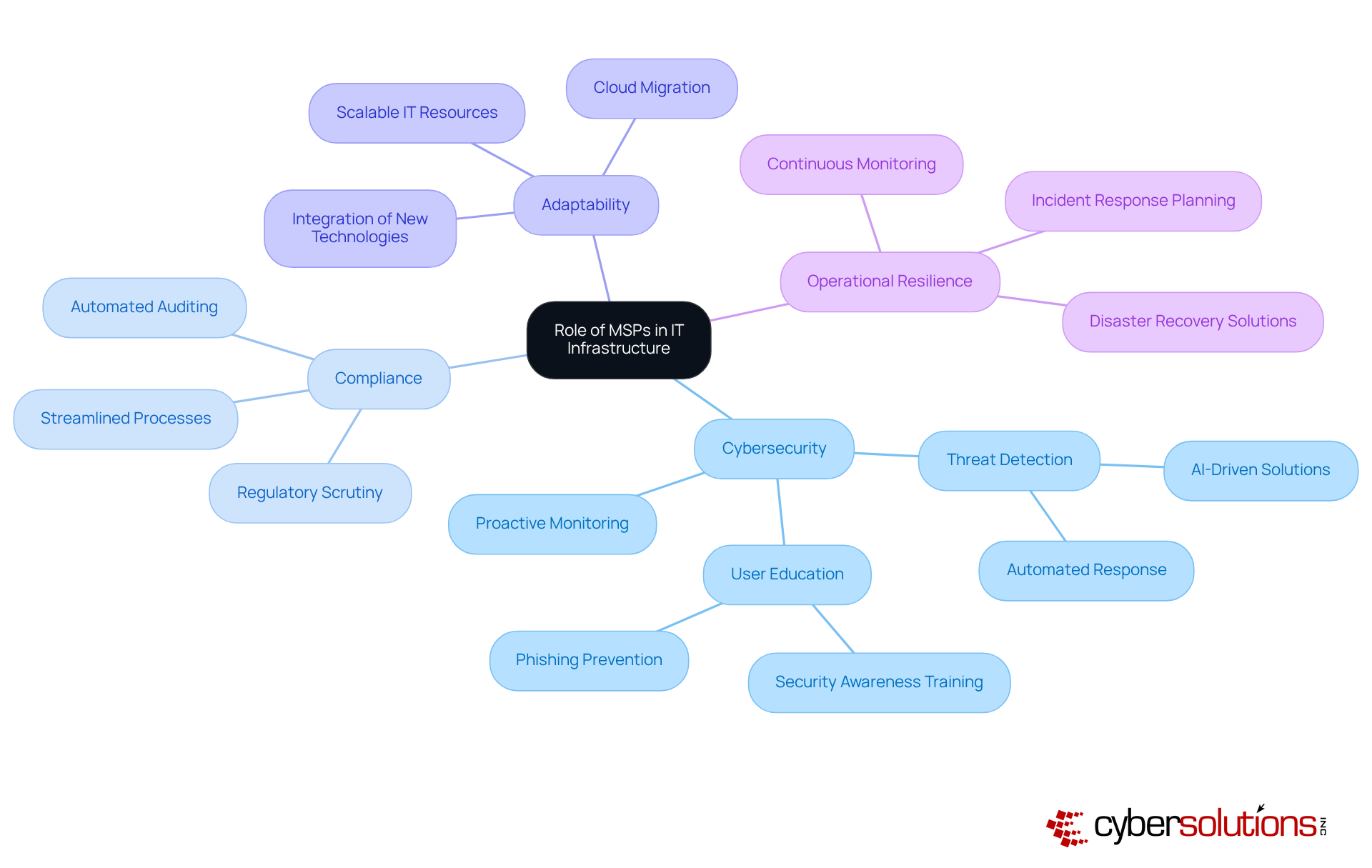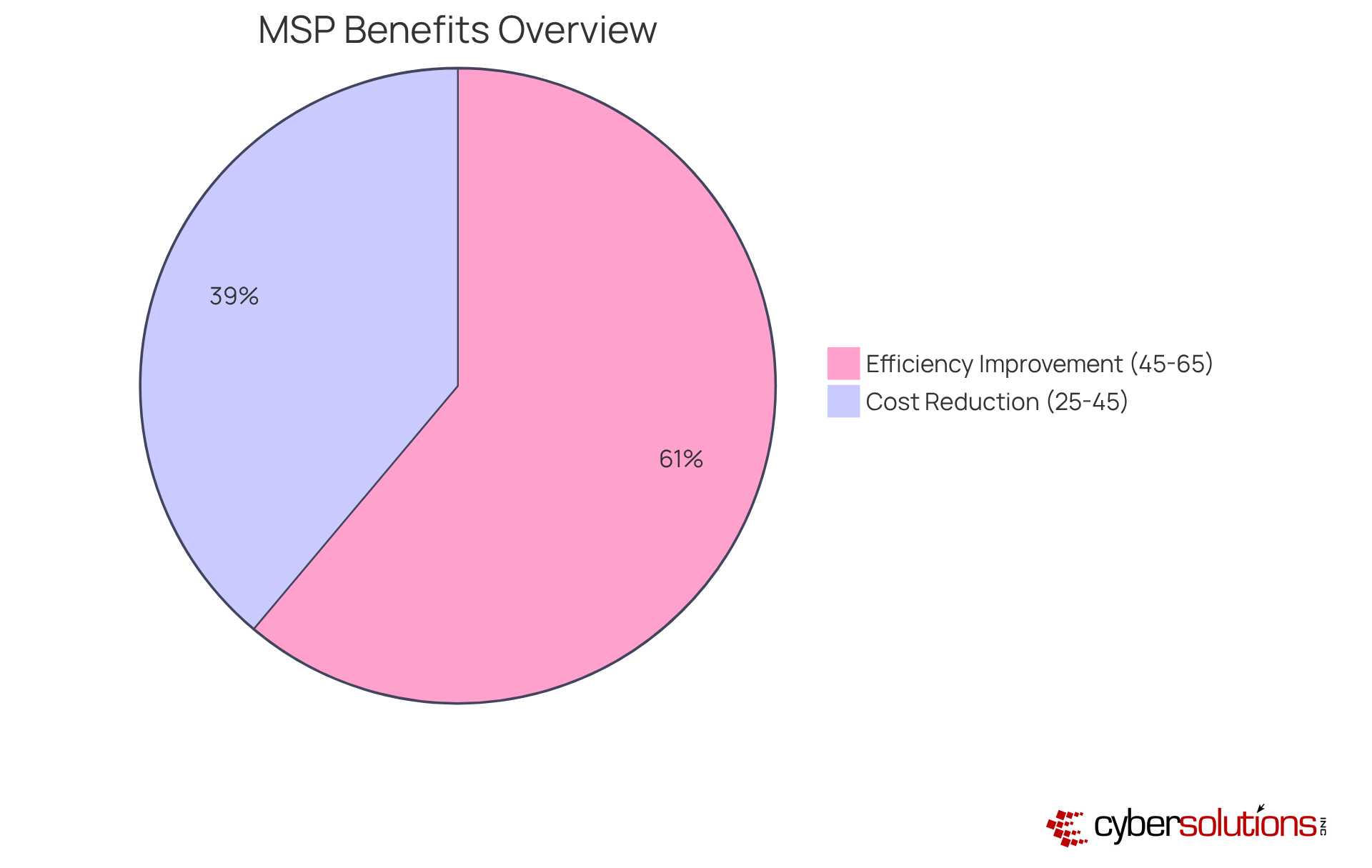
In today's fast-paced business environment, the role of Managed Service Providers (MSPs) has never been more crucial. As organizations navigate an increasingly complex landscape defined by technology, MSPs not only enhance operational efficiency but also provide strategic advantages that can significantly reshape IT management. With cyber threats on the rise and compliance complexities mounting, businesses must ask themselves: how can partnering with an MSP redefine their operational resilience and financial performance in this ever-evolving digital landscape?
The current cybersecurity threats pose unique challenges for organizations, particularly in sectors like healthcare where sensitive data is at stake. CFOs are increasingly tasked with ensuring that their organizations not only comply with regulations but also protect against potential breaches that could jeopardize their financial standing and reputation. This is where MSPs come into play, offering tailored solutions that address these pressing concerns.
By leveraging the expertise of MSPs, organizations can bolster their defenses against cyber threats while streamlining their IT operations. These providers bring a wealth of knowledge and resources, enabling businesses to focus on their core objectives without the constant worry of technological vulnerabilities. In this context, the partnership with an MSP becomes not just a strategic move but a necessity for sustainable growth and security.
In today's business landscape, the msp company meaning highlights the crucial role that Managed Service Providers (MSPs) play in enhancing operational efficiency and reducing costs. These specialized third-party companies remotely oversee a customer's IT infrastructure and end-user systems, allowing organizations to focus on their core business functions. By outsourcing their technology needs, companies can ensure that they are met with both efficiency and expertise.
The services offered by MSPs, which align with the msp company meaning, are diverse, encompassing:
All tailored to meet the unique requirements of their clients. As of 2025, approximately 62% of enterprises report relying on MSPs, reflecting a significant trend towards outsourcing IT operations. This shift not only enhances operational efficiency but also alleviates the financial burden associated with maintaining in-house IT teams.
Numerous successful examples illustrate the effectiveness of MSPs across various sectors. For instance, organizations in healthcare and finance have reported improved compliance and security postures through strategic collaborations with these providers. Industry leaders emphasize that the MSP company meaning goes beyond being mere service providers; they are strategic collaborators that drive business transformation. As one expert noted, "Managed Service Providers that clearly articulate their unique offerings and demonstrate measurable outcomes will stand out in today's crowded marketplace." This statement underscores the growing recognition of MSPs as vital allies in navigating the complexities of contemporary IT environments.

In today's digital landscape, cybersecurity is not just a concern; it's a necessity, especially in sectors like healthcare. The msp company meaning highlights how Managed Service Providers (MSPs) play a pivotal role in this arena by expertly managing and optimizing IT infrastructure to safeguard sensitive data. With proactive monitoring and maintenance, they ensure that systems operate smoothly and securely, significantly reducing the risks associated with cyber threats and compliance challenges.
Organizations leveraging MSPs often report enhanced security postures and streamlined compliance processes. This is particularly crucial in highly regulated sectors, where the stakes are high. For instance, consider the healthcare industry, where patient data must be protected against evolving cyber threats. How can CFOs ensure their organizations remain compliant while navigating these challenges? The answer lies in strategic partnerships with MSPs, which exemplify the msp company meaning by providing expertise and the technological advancements necessary to adapt to changing demands.
Moreover, this adaptability allows companies to scale their IT resources efficiently, facilitating growth without the burden of substantial capital investments. As industries face increasing regulatory scrutiny, the collaboration with an MSP becomes essential for maintaining operational resilience and compliance. In a world where cyber threats are ever-present, can your organization afford to overlook the benefits of such a partnership?

In today's rapidly evolving digital landscape, cybersecurity is not just an option; it's a necessity for organizations striving to remain competitive and secure. Managed IT Providers, which embody the msp company meaning, offer a comprehensive suite of solutions tailored to meet the diverse needs of businesses, ensuring they navigate the complexities of modern IT environments effectively.
24/7 Help Desk Support: Continuous assistance for IT issues is crucial. This service significantly reduces downtime and enhances productivity. Organizations leveraging round-the-clock support can respond swiftly to incidents, minimizing disruptions to operations.
Endpoint Protection: With 90% of successful cyberattacks originating from endpoint devices, robust measures to safeguard these devices against malware and cyber threats are essential. Success stories from various entities demonstrate that comprehensive endpoint security strategies can drastically reduce the risk of breaches and bolster overall security posture.
Backup and Disaster Recovery: The msp company meaning includes developing and implementing plans to protect critical data, ensuring operational continuity during incidents. This proactive approach is vital for organizations that cannot afford data loss or extended downtime.
Co-managed IT Support: By partnering with internal IT teams, MSPs enhance existing capabilities, providing additional expertise and resources. This collaboration allows organizations to optimize their IT infrastructure while retaining control over their operations.
Managed Security Services: Advanced cybersecurity measures, including threat detection and incident response, are integral to MSP offerings. As cyber threats escalate, these services ensure organizations remain compliant with industry regulations and are prepared to respond effectively to incidents.
Compliance as a Service (CaaS): Navigating complex regulatory requirements can be daunting. Managed Service Providers offer CaaS, encompassing evaluations, policy creation, oversight, and audit readiness, ensuring organizations comply with standards like HIPAA, PCI-DSS, and CMMC.
These offerings collectively enhance operational efficiency and compliance, positioning MSPs as indispensable partners for organizations, which illustrates the msp company meaning in addressing the challenges of modern IT. The integration of 24/7 support, endpoint protection, and CaaS is particularly significant, addressing the urgent need for continuous vigilance against evolving threats and regulatory demands.

Engaging an MSP company meaning is not just a strategic move; it’s a vital step toward enhancing an organization’s financial health. In today’s competitive landscape, outsourcing IT services allows businesses to significantly lower overhead costs associated with hiring and training in-house staff. Did you know that successful deployment of Managed Services can reduce IT costs by 25%-45% and boost operational efficiency by 45%-65%? This is not merely a statistic; it’s a game changer for organizations looking to optimize their resources.
Moreover, managed service providers offer predictable pricing models, including flat-rate pricing that simplifies budgeting and eliminates unexpected expenses. This enables companies to plan their finances more effectively, encompassing everything from email licenses to advanced cybersecurity solutions. Imagine having peace of mind with a comprehensive package that covers all your IT needs.
The return on investment (ROI) from partnering with an MSP is often realized through improved operational efficiency, reduced downtime, and a fortified security posture. Proactive measures, such as application allowlisting, prevent unauthorized software from executing, enhancing compliance with regulatory standards. Additionally, 24/7 network monitoring ensures continuous oversight of systems, further mitigating risks.
Such strategic engagement not only bolsters financial performance but also guarantees adherence to stringent data protection protocols. As technology evolves, MSPs are expected to play a crucial role in addressing new regulations and cyber threats. This highlights that the msp company meaning is a critical financial decision for organizations aiming to thrive in the modern business landscape.

Managed Service Providers (MSPs) are not just service vendors; they are strategic partners that profoundly impact an organization's operational efficiency and financial health. In an era where cybersecurity threats loom large, outsourcing IT functions allows businesses to focus on their core activities while leveraging the expertise and resources that MSPs offer. This partnership exemplifies the essence of what an MSP represents, underscoring their vital role in navigating the complexities of modern technology landscapes.
Key insights shared throughout this article reveal the diverse services provided by MSPs, including:
The financial implications of engaging an MSP are significant, showcasing how organizations can achieve substantial cost reductions and improved ROI. Furthermore, the adaptability and continuous support offered by MSPs empower companies to enhance their security posture and stay compliant with ever-evolving regulations.
In conclusion, collaborating with Managed Service Providers is not merely beneficial; it is a strategic necessity for organizations aiming to thrive in today's competitive environment. By harnessing the expertise of MSPs, businesses can enhance their operational capabilities and safeguard their future against the backdrop of increasing cyber threats and regulatory demands. Embracing this partnership is not just an option; it is a critical step towards sustainable growth and success in the digital age.
What are Managed Service Providers (MSPs)?
Managed Service Providers (MSPs) are specialized third-party companies that remotely oversee a customer's IT infrastructure and end-user systems, allowing organizations to focus on their core business functions.
What services do MSPs offer?
MSPs offer a diverse range of services, including network management, cybersecurity, data backup, and compliance support, all tailored to meet the unique requirements of their clients.
What is the trend regarding the reliance on MSPs in businesses?
As of 2025, approximately 62% of enterprises report relying on MSPs, reflecting a significant trend towards outsourcing IT operations to enhance operational efficiency and reduce costs.
How do MSPs impact operational efficiency and financial burden?
By outsourcing technology needs to MSPs, companies can enhance operational efficiency and alleviate the financial burden associated with maintaining in-house IT teams.
Can you provide examples of sectors that benefit from MSPs?
Yes, organizations in sectors such as healthcare and finance have reported improved compliance and security postures through strategic collaborations with MSPs.
How do industry leaders view the role of MSPs?
Industry leaders emphasize that MSPs are not just service providers; they are strategic collaborators that drive business transformation and help navigate the complexities of contemporary IT environments.
What is essential for MSPs to stand out in the marketplace?
MSPs that clearly articulate their unique offerings and demonstrate measurable outcomes will stand out in today's crowded marketplace, according to industry experts.